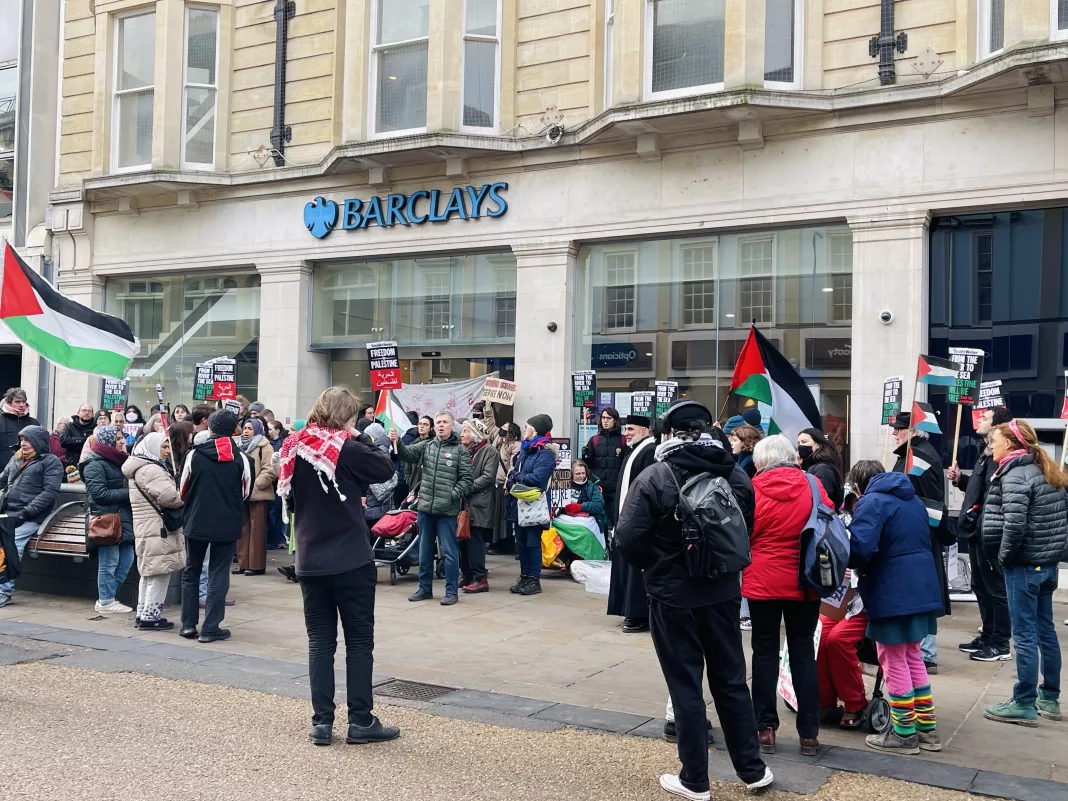Around a hundred protesters blocked the entrance to Barclays on Cornmarket Street in a demonstration organised by Oxford Palestine Solidarity Campaign (PSC) in support of the boycott, divestment, and sanctions (BDS) movement currently targeting the bank. Chants repeated by attendees included “Barclays Bank, you can’t hide / You’re supporting genocide,” “Barclays Israel USA / How many kids did you kill today,” and “Barclays Bank, shame on you / You’re supporting war crimes too.”
According to PSC, Barclays “holds over £1 billion in shares and provides over £3 billion in loans and underwriting to nine companies whose weapons, components, and military technology are being used by Israel in its attacks on Palestinians. This includes General Dynamics, which produces the gun systems that arm the fighter jets used by Israel to bombard Gaza, and Elbit Systems, which produces armoured drones, munitions and artillery weapons used by the Israeli military.”
One of the protest organisers told Cherwell that other banks like HSBC have divested from arms companies, but Barclays has yet to do so.
Oxford PSC spokesperson Caroline Raine told Cherwell that the protesters’ ultimate aim is for Barclays to end these financial ties. To this end, Raine stated: “We are asking people to email Barclays and demand it ends its relationship with these companies. We are particularly asking Barclays customers to hand in a letter to their bank manager. We are also asking those who do not currently bank with Barclays to explain why they would not consider doing so at the present time.”
An Oxford resident who exited Barclays amid the protest told Cherwell that he came to support the movement’s aims after listening to the demonstrators. Despite this, he said that the protesters’ demand for Barclays customers to write to their bank managers is quite demanding on people’s time, and his family has no choice but to bank with Barclays because of a lack of alternatives.
Half an hour into the protest, Barclays decided to close for the day. A policeman on scene told Cherwell that because Barclays was closed, the protesters were allowed to block the entrance, although the protesters could be removed if the bank requested.
An Oxford student who tried to enter Barclays for business was turned away at the door by security personnel. She told Cherwell that she was “confused and caught off-guard.”
The BDS movement against Israel today is modelled on the strategy of BDS used by British students in the South Africa Apartheid Divestment Movement from 1969 to 1987. It forced an end to the bank’s investments in their subsidiaries involved in South African apartheid, and PSC is now adopting a similar strategy.
Chairman of Oxford PSC David Hillman told Cherwell that they are moving from marches to boycotts because of their effectiveness. He cited the case of Puma, a company which recently ended its sponsorship of the Israeli Football Association when faced with mounting pressure from the BDS movement (Puma, however, claims that the divestment was unrelated).
The protest ended with performances led by the Didcot Red Kites and Oxford Seagreen Singers. Lyrics, written specifically for this occasion, included “Barclays! Arms Trade! Life is cheap to them. Do they care?” and “Customers, shut Barclays down. Run Barclays right out of town.” The crowd left a bed sheet covered with blood-like handprints taped to the bank’s door.
Cherwell has contacted Barclays and Oxford’s Israel Society (IsraelSoc) for comment.


